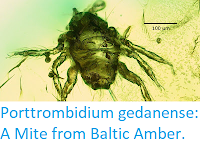Mites (Acari) are small Arachnids related to Harvestmen
(Opilones). They are one of the most
numerous and diverse Arthropod groups, with over 48 000 known species,
but are often overlooked due to their small size. Many Mites are
parasitic, with species targeting Insects, Vertebrates, Plants and even
Fungi. The earliest known fossil Mites are found in the Early
Devonian Rhynie Chert of Scotland, making them about 410 million years
old. Mesostigmatid Mites are large, soil dwelling Mites in the Order Parasitiformes, though they are oftern predatory rather than parasitic in nature, feeding on Insects or other Mites.
In a paper published in the Turkish Journal of Zoology on 26 July 2018, Sanaz Javan of the Department of Entomology at the Islamic Azad University at Shiraz, Mehmet Karaca of the Department of Electronic and Automation at the Denizli Vocational School of Technical Sciences, and Raşit Urhan of the Department of Biology at Pamukkale University, describe a new species of Mesostigmatid Mites from Fars Province in southern Iran.
The new species is placed in the genus Zercon and given the specific name ostovani in honour of Hadi Ostovan, of the Islamic Azad University of Shiraz, for his work on the Mites of Iran. The species is described from five female specimens extracted from a soil sample taken from under a hybrid Red Horse Chestnut (Aesculus × carnea) growing in the Eram Botanical Garden in Shiraz. These range from 496 to 512 μm in length and have twenty pairs of setae (hairs) on the dorsal sides of their podonotal shield.
The new species is placed in the genus Zercon and given the specific name ostovani in honour of Hadi Ostovan, of the Islamic Azad University of Shiraz, for his work on the Mites of Iran. The species is described from five female specimens extracted from a soil sample taken from under a hybrid Red Horse Chestnut (Aesculus × carnea) growing in the Eram Botanical Garden in Shiraz. These range from 496 to 512 μm in length and have twenty pairs of setae (hairs) on the dorsal sides of their podonotal shield.
Zercon ostovani under the stereomicroscope, dorsal view of female. Scale bar is 100 μm. Javan et al. (2018).
See also...
Follow Sciency Thoughts on Facebook.







